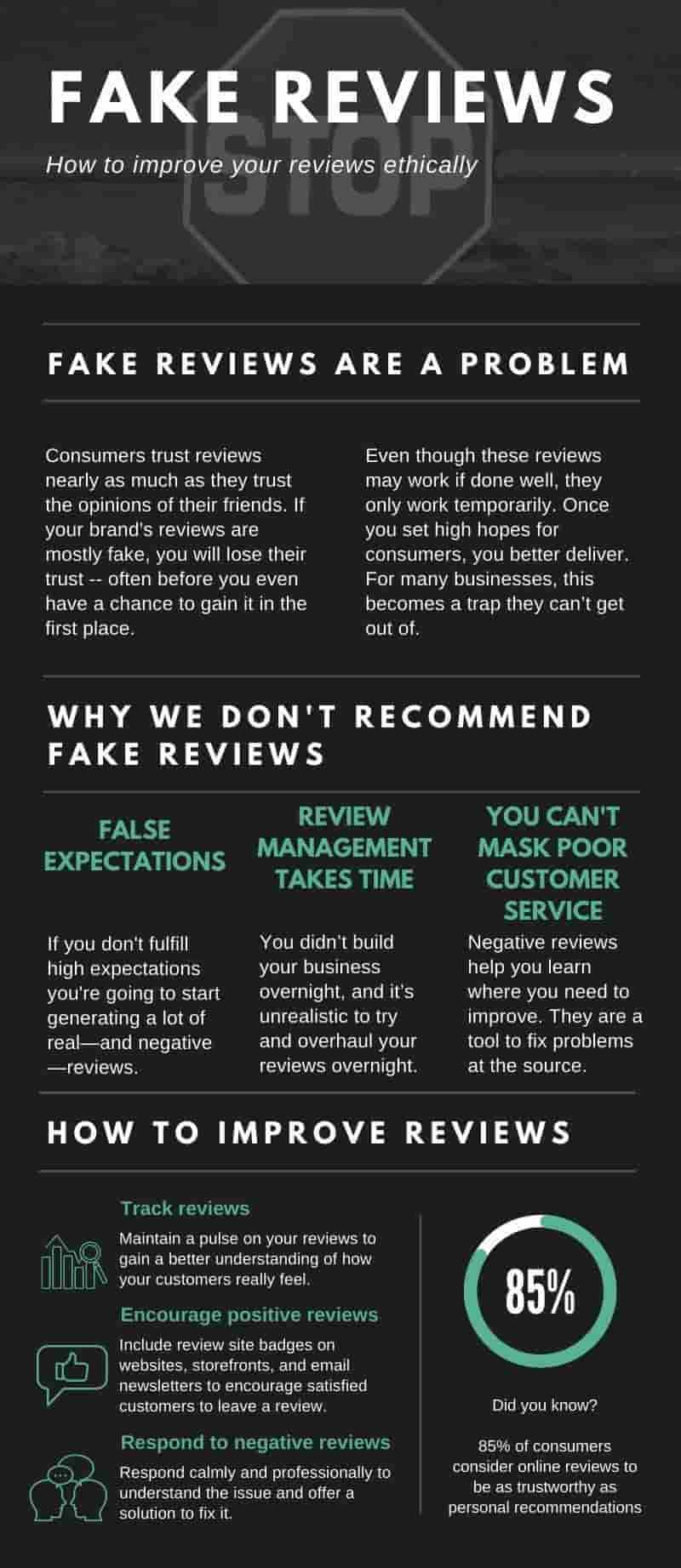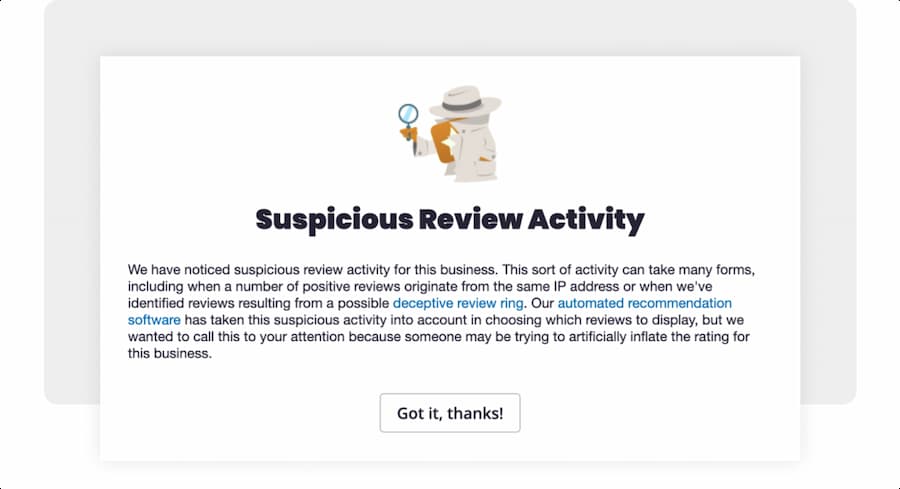Fake Reviews – Like Fake News on a Smaller Scale
Fake reviews are like fake news but on a smaller scale
(Almost) everybody knows that you can’t believe everything you read on the Internet – even reviews. A consumer review study found that 84% of consumers consider online reviews to be as trustworthy as personal recommendations.
Still, from fabricated news stories to Photoshopped pictures, things aren’t always what they seem. Not all trickery is obvious, though, and many companies actively fabricate reviews online to portray a positive image and to try to boost their reputation.
Fake reviews have become such a big problem that companies like Amazon, Yelp, and Google have taken measures (and in some cases, legal action) to help block the influx of fake reviews on their sites.

People trust the opinions of strangers
We trust reviews nearly as much as we trust the opinions of our friends. In fact, 85% of consumers trust online reviews as much as personal recommendations.
Considering what we know about the propensity of businesses to post fake reviews—either by themselves or through hiring others to write them—what does this mean for building trust in a brand? If a consumer knows that many of the reviews they read online are fake, at what point are they going to stop believing the real ones?
Fake reviews are a disservice to both the business about which the reviews are written and to the consumers who read them. But a lot of the time, the fake reviews work. Like anything bad on the Internet, they’re there because there’s something to be gained.
But there’s a lot to be lost, too. Even though these reviews work if done well, they only work temporarily. Once you set high hopes for consumers, you better deliver. For many businesses, this becomes a trap they can’t get out of.
The major review sites are pushing back on fake reviews by introducing new consequences for negative reviews.
- Yelp consumer alerts: If Yelp detects suspicious activity on a business profile, it may add a consumer alert to the page. These alerts serve as notices to consumers in an effort to fight the spread of misinformation. Types of suspicious alerts include Compensated Activity Alert, Compensated Activity Alert, Questionable Legal Threats Alert, Unusual Activity Alert, Public Attention Alert, and Racist Behavior Alert.

- Remove reviews: It has become a standard process for review sites to remove illegitimate reviews. In 2020, Google removed 55 million policy-violating reviews and almost three million fake business profiles.
Setting expectations for fake reviews
The main problem with fake reviews? False expectations. If a consumer sees a glowing review and then interacts with the business in question, they’re going to expect a certain level of service. And if the business doesn’t fulfill those high expectations, they’re going to start generating a lot of real—and negative—reviews.
In other words, if your company isn’t generating positive reviews, and you need to buy fake reviews, the problem will most likely crop up again.
Why we don’t recommend fake reviews
Businesses put trust and effort into fake reviews for two reasons:
- They have a negative online reputation that they are trying to hide.
- They have no online reputation and need to get the conversation going.
…but what are you really getting from these reviews?
On the surface, both reasons make fake reviews seem like a good idea. Surely good reviews are better than no reviews, and they’re certainly better than bad reviews. But we’ve found that fake reviews really aren’t the right choice.
Here’s why:
Negative reviews can be removed or overwhelmed with good reviews over time. Negative reviews help companies learn where they need to improve and can be beneficial tools in increasing success and business. Do poor work or offer substandard services, and your reviews will reflect it. Do good work and go above and beyond for your clients or customers, and your online reputation will improve.
Success is about efficiency. In a free-market economy, it’s the best of businesses that survive and prosper. There’s a competitor around every corner, but you can’t beat them with fake reviews. You’ve got to do real, good work, over time and with purposeful intent. The good reviews will follow.
Patience is a virtue. You didn’t build your business overnight, and it’s unrealistic to try and build your online reputation overnight. Review websites notice if a lot of reviews get posted in quick succession, and it’s an obvious red flag to them. This results in reviews getting removed, which means you could lose some of the real ones, too.
What you should do instead
At Reputation X, we believe in the power of a genuine review. We recommend using review management software to track the reviews that come in—good and bad—in addition to a proactive internal process for attaining good reviews. The right review management strategy combined with the right software can do wonders. As your dedicated partners in reputation management, we’re here to help you build up your good image online, without cutting any corners.
That means providing your customers with exceptional service and then encouraging (but not pressuring) them to share their experience with your company online through an authentic review. Trust builds over time, and the fallout of being flagged for fake reviews isn’t worth the immediate boost they may offer.
Let Reputation X help shape your online presence, so that when people search for you, not only do they see a positive image, they see a trustworthy image.
Fake reviews FAQs
Why are fake reviews a problem?
Fake reviews are a problem because they don’t work in the long run. You may see short-term results if you buy fake reviews, but eventually, consumers will notice if your products don’t live up to your sterling reviews. Then you’ll get an influx of negative reviews that you will then have to clean up.
Why do businesses buy fake reviews?
Businesses put trust and effort into fake reviews for two reasons. They have a negative online reputation that they are trying to hide. Or they have no online reputation and need to get the conversation going.
How can you legitimately improve online reviews?
Establish a review management plan that tracks both positive and negative online reviews, encourages positive reviews from satisfied customers, and responds to negative reviews. Aim to fix any problems at the source to avoid more similar negative reviews in the future.
About the author
Kent Campbell is the chief strategist for Reputation X, an award-winning online reputation management agency. He has over 15 years of experience with SEO, Wikipedia editing, review management, and online reputation strategy. Kent has helped celebrities, leaders, executives, and marketing professionals improve the way they are seen online. Kent writes about reputation, SEO, Wikipedia, and PR-related topics.
–
Tags: Business Reputation Repair, Corporate Reputation, Review Management.
